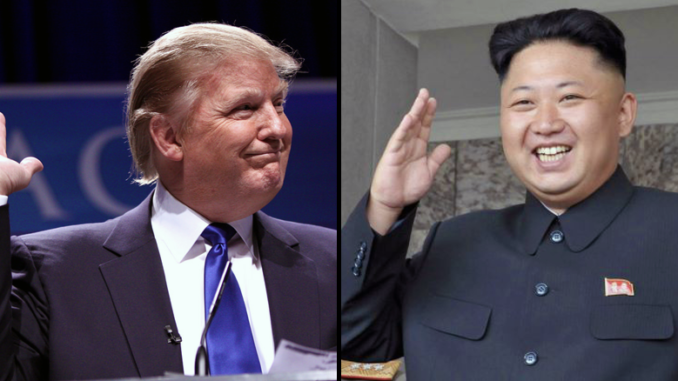
The first summit between the leaders of United States and North Korea is now just hours away. President Trump and his North Korean counterpart Kim Jong-un have taken different approaches in the lead-up to the summit. The combination of these differing approaches, the gulf of issues that divide the United States and North Korea, and the contrasting personal characteristics of the two heads of state make for a higher level of uncertainty than might otherwise be the case.
In terms of the approaches the two leaders took ahead of the summit, NBC News reported on June 10:
President Donald Trump says his approach to the high-stakes summit with North Korean leader Kim Jong Un — which begins Tuesday on a secluded island resort in Singapore — is not about preparation. “It’s about attitude,” he said last week.
He’ll know in the “first minute” if the North Koreans are serious about negotiating, he boasted on Saturday. “Just my touch, my feel,” he said. “It’s what I do.”
With respect to Kim Jong-un, NBC’s story continued:
According to some reports, his [Kim Jong-un’s] diplomats have been peppering South Koreans with detailed questions about Trump and American politics, even asking about that unusual recent Alabama Senate race.
Kim Jong Un may represent the so-called hermit kingdom, but he is viewed by U.S. officials as a clever and well-prepared, indeed ruthless, adversary. He will be relying on much more than “attitude” as he gets ready to meet the American president.
From more than a quarter century of diplomatic experience, the issues involved are well-defined. From the U.S. side, those issues include: North Korea’s denuclearization, North Korea’s ballistic missile programs, North Korea’s chemical and biological weapons programs, and North Korea’s weapons proliferation activities. From the North Korean side, the issues include: security guarantees (including U.S. withdrawal of troops from South Korea), sanctions relief, trade, economic reconstruction, and the terms of a framework for Korean re-unification. The biggest implementation issue concerns the need for stringent verification on account of a mutual lack of trust and North Korea’s past failures to honor the terms of its agreements.
At present, a failed summit appears to be unlikely, but not a zero prospect. By “failed summit,” I mean an outcome in which the talks break up without even a joint statement. Both leaders have too much at stake to permit such an outcome. Indeed, President Trump’s disastrous G-7 summit has only increased the pressure on him to achieve even a minimal result. North Korea’s leader has come too far to leave Singapore empty-handed. Such an outcome would likely end the latest North Korean attempt to re-engage with the world.
Coming into the summit, much is known about President Donald Trump. He is impatient, seeks to avoid detail and nuance, is dismissive of facts that contradict his worldview, possesses supreme confidence in his own negotiating ability, thirsts for public attention, is thin-skinned, holds grudges, has a deep need for affirmation, and conducts himself in a blunt and often crude fashion.
Less is known about Kim Jong-un. What is known is that he is brutal, disciplined, patient, and, at least according to Singapore Prime Minister Lee Hsien Loong, a “confident, young leader.” His discipline and patience were in full evidence when the mercurial Trump briefly canceled the scheduled summit. North Korea’s leader never flinched and Trump made a U-turn.
News reports have indicated that the two leaders will meet one-on-one at the opening of the summit with only translators present. Trump will likely be forceful but very general in his opening statement. Lacking extensive preparation, he likely won’t articulate a detailed definition of America’s position on denuclearization, much less wade into technical matters such as how a verification regime might function.
Kim will likely couch his opening statement in flattery. He will seek to appeal to Trump’s desire to be a historic figure (probably drawing a contrast with President Obama whom Trump holds in disdain), portray the summit as a chance for the world to see Trump’s deal-making capacity, and argue that the summit is an opportunity for Trump to establish a lasting personal legacy. These tactics will target Trump’s personal characteristics and needs to try to “soften” Trump’s bargaining positions.
As Trump has not studied the history of the Korean war and subsequent dispute in detail, Kim could lead Trump down unfamiliar diplomatic paths. Doing so could give Kim an advantage in securing concrete gains e.g., obtaining a staged lifting of sanctions, both for performance and possibly even promises. He could also tap into Trump’s failed G-7 effort for additional leverage, calculating that Trump needs a deal more badly than he does. Whether that calculation is accurate remains to be seen. However, North Korea has already demonstrated that even when confronted with immense hardship, it has not fulfilled terms that would lead it away from its strategic goals. Therefore, unless there has been a fundamental change in some of those goals, North Korea could walk away from a deal that does not meet its strategic desires.
There remains a small possibility that Kim could attempt to play the role of a North Korean “Gorbachev” in proposing a genuine break from North Korea’s longstanding posture. However, Trump is no “Reagan.” Trump’s foreign policy team lacks the depth, expertise, and technical skills that Reagan’s possessed. Trump has also weakened America’s strategic relationships and shown a capacity to abandon American commitments. All of those factors could undermine his ability to seize such a moment should it present itself.
Perhaps the most likely scenario remains a joint statement with all-too-familiar language about denuclearization, security guarantees, economic partnership, and commitments to peace. As has been the case throughout the past quarter-century of diplomacy, the really difficult tasks would again be left to the future. That’s where the real hazards would lie. That’s where things have fallen apart before.

1 Trackback / Pingback
Comments are closed.